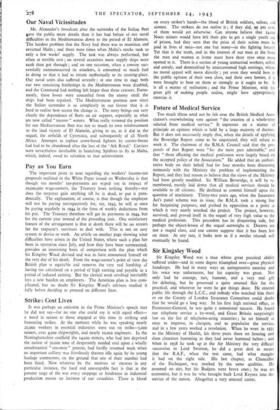Our Naval Vicissitudes
Mr. Alexander's broadcast after the surrender of the Italian fleet gave the public more details than it has had before of our naval difficulties in the Mediterranean down to the period of El Alamein. The hardest problem that the Navy had there was to munition and revictual Malta ; and there were times when Malta's stocks sank to only a few weeks' supply. The task was always performed, but often at terrible cost ; on several occasions more supply ships were sunk than got through ; and on one occasion, when a convoy suc- cessfully outmanoeuvred its attackers, it consumed so much fuel in doing so that it had to return ineffectually to its starting-place. Our naval units also suffered severely ; at one time in 1942 both our two remaining battleships in the Mediterranean were disabled, and the Command had nothing left larger than three cruisers. Fortu- nately, these losses were concealed from the enemy until the ships had been repaired. The Mediterranean position now since the Italian surrender is so completely in our favour that it is hard to realise how recent the change is. The story brings out very dearly the dependence of fleets on air support, especially in what are now called " narrow " waters. What really restored the position for our Mediterranean fleet was not so much its own reinforcement as the land victory of El Alamein, giving to us, as it did in the sequel, the airfields of Cyrenaica, and subsequently of all North .Africa. Attempts to replace coast-based fighters by carrier-borne had had to be abandoned after the loss of the ' Ark Royal.' Carriers were nevertheless invaluable in launching Spitfires to fly to Malta, which, indeed, owed its salvation to that achievement.


























 Previous page
Previous page